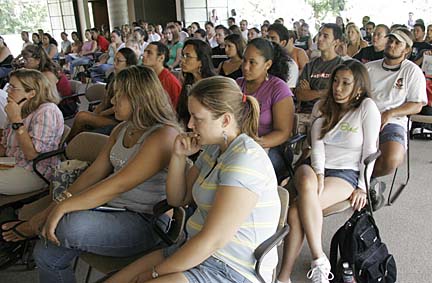Hui Malama says complying with ruling is not an option
Honolulu Star-Bulletin
Wednesday, September 14, 2005
By Sally Apgar
sapgar@starbulletin.com
CRAIG T. KOJIMA / CKOJIMA@STARBULLETIN.COM
Audience members listened yesterday at a Hui Malama I Na Kupuna O Hawaii Nei forum at the University of Hawaii-Manoa. Hui Malama, which is fighting over artifacts from the "Forbes" cave, held a discussion about its appeal with the 9th U.S. Circuit Court.Edward Halealoha Ayau calls a recent federal court order requiring the return of 83 priceless artifacts "a defining moment" for native Hawaiians' spiritual and cultural heritage.
"The choice is made. We must stand and protect our kupuna (ancestors)," said Ayau, who for the last 16 years has worked to repatriate native Hawaiian remains and burial items from museums so they can be reburied to honor the wishes of kupuna.
At a news conference and forum yesterday at the Center for Hawaiian Studies at the University of Hawaii at Manoa, Ayau said: "This is a wake-up call to take care of our ancestors," referring to the federal court case that involves 83 items reburied in 2000 in Kawaihae or "Forbes" cave on the Big Island.
Ayau is a founding member of a controversial group, Hui Malama I Na Kupuna O Hawaii Nei, which was formed in 1988 when, during the construction of the Ritz Carlton on Maui, about 1,100 native Hawaiian remains were found.
Ayau said he would not retrieve the Kawaihae items as ordered earlier this month by U.S. District Judge David Ezra. "We will not be a party to theft from our kupuna," he said.
Despite repeated questions from the media, Ayau did not specifically say that he would go to federal prison rather than comply with Ezra's order to retrieve the items and hand them over to the Bishop Museum so that 13 native Hawaiian claimants to the items can decide their fate.
Last week, Ezra gave Ayau and his group until Sept. 23 to return the burial items, or "moepu," that they reburied in Kawaihae in 2000 to honor the wishes of their kupuna. Two of the 13 recognized claimants filed a federal lawsuit earlier this month asking that the court order the return of the 83 items, so that the competing native Hawaiian claimants can have an equal say on what will happen to the items.
The two are suing under Fifth Amendment property rights laws and provisions of the Native American Graves Protection and Repatriation Act, which Congress passed in 1990 to right the wrongs of the past.
NAGPRA is a federal law that governs the repatriation of human remains and artifacts. In his written order, Ezra questioned whether a valid repatriation of the items occurred.
The two plaintiffs are La'akea Suganuma, a practitioner of native Hawaiian martial arts and the president of the Royal Academy of Traditional Arts, and Na Lei Alii Kawananakoa, a group founded by Abigail Kawananakoa, a wealthy Campbell Estate heiress and descendent of royal native Hawaiian blood.
Ayau and others made it clear yesterday that disinterring the items, which do not include the bones of ancestors, would spiritually desecrate the grave in a way that could not be later fixed.
In granting the injunction, Ezra wrote the priceless items "are at serious risk" from environmental harm and possible theft.
Hui Malama filed an emergency appeal of the order with the 9th U.S. Circuit Court of Appeals in San Francisco last week arguing: "There is no safe manner by which to carry out the (U.S.) District Court's order as it would place ... members of Hui Malama in real physical and spiritual danger."
In addition to bark cloth and canoe parts, the items in the cave include several priceless carved wooden ki'i (typically carved as wooden protecting gods for a specific person).
Ayau said he finds himself at odds between his spiritual beliefs to honor and returning iwi (human remains) and moepu (burial objects) to what his group believes is their intended home, according to the wishes of kupuna, and federal laws that govern the processes returning various native Hawaiian items to burial sites. The 83 items do not include any bones or iwi.
Yesterday, Ayau appeared with several high-profile native Hawaiians, including Pualane Kanahele, Charles Maxwell and others to explain Hui Malama's side to reporters and UH students.
Ayau said: "The court has ordered us to do the unthinkable ... to steal from our kupuna."
Charles Maxwell, a longtime activist, said: "It is against our will, our desire and our First Amendment right to freedom of religion to direct us to the cave to take the moepu. It is against our will; it is against our cultural being."
In 1905, three men, including David Forbes, whom Hui Malama identified as grave robbers, got the items appraised by the Bishop Museum for $472.
"It is illegal to steal from kupuna," said Kaleikoa Kao, another member of Hui Malama. "Judge Ezra is putting us into a very difficult position: What is the price of the integrity of our culture?"
Hui Malama I Na Kupuna 'O Hawai'i Nei
© 1996-2005 The Honolulu Star-Bulletin | www.starbulletin.com
Original article URL: http://starbulletin.com/2005/09/14/news/story3.html
